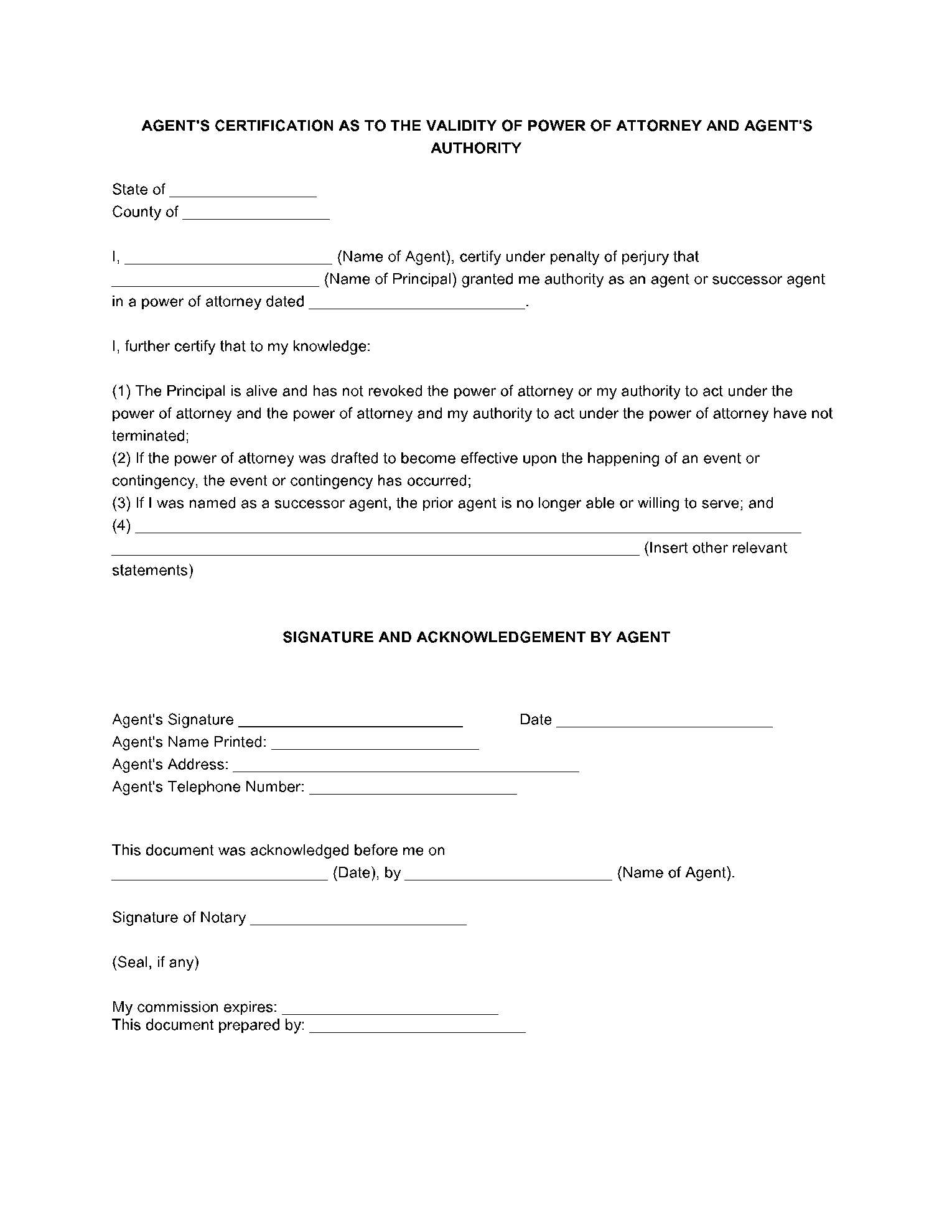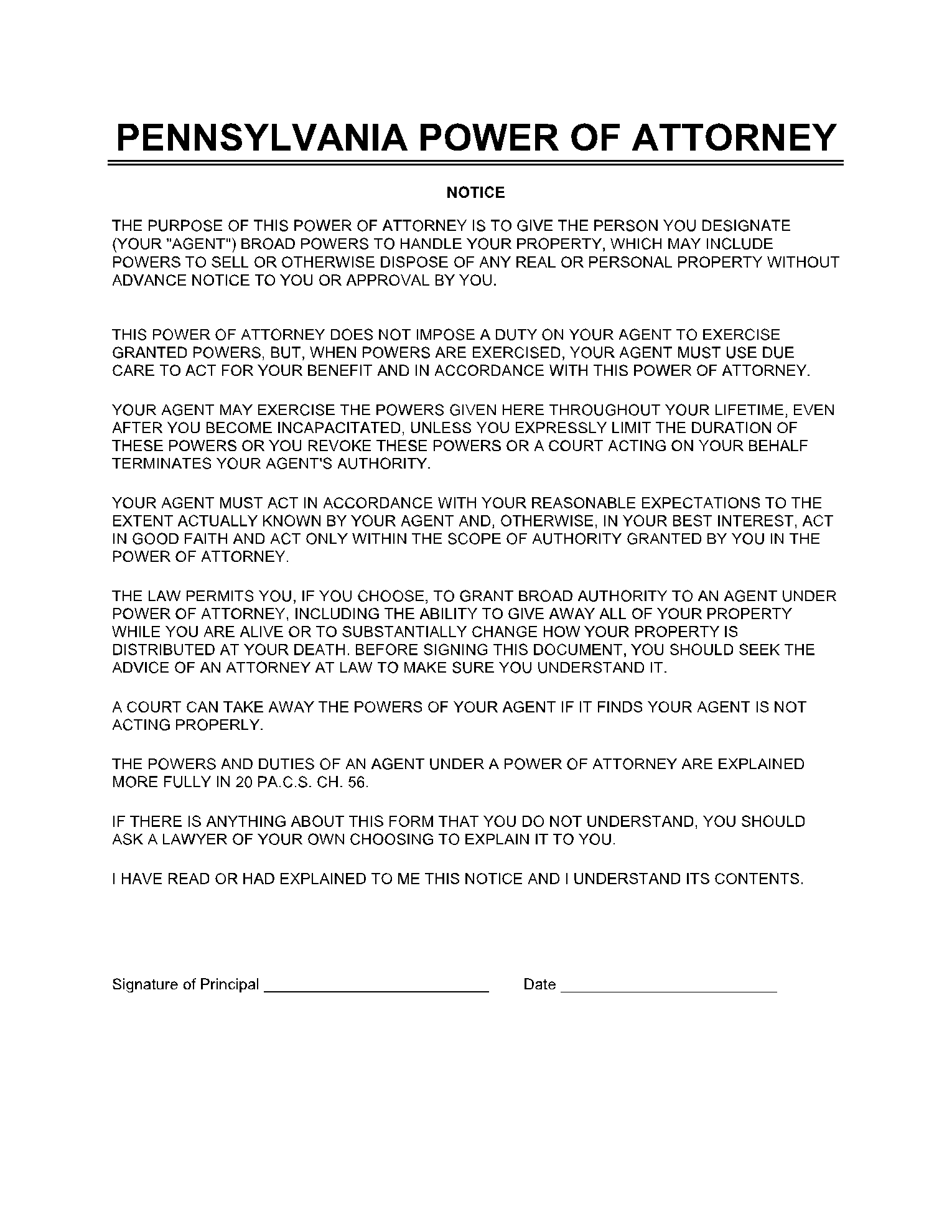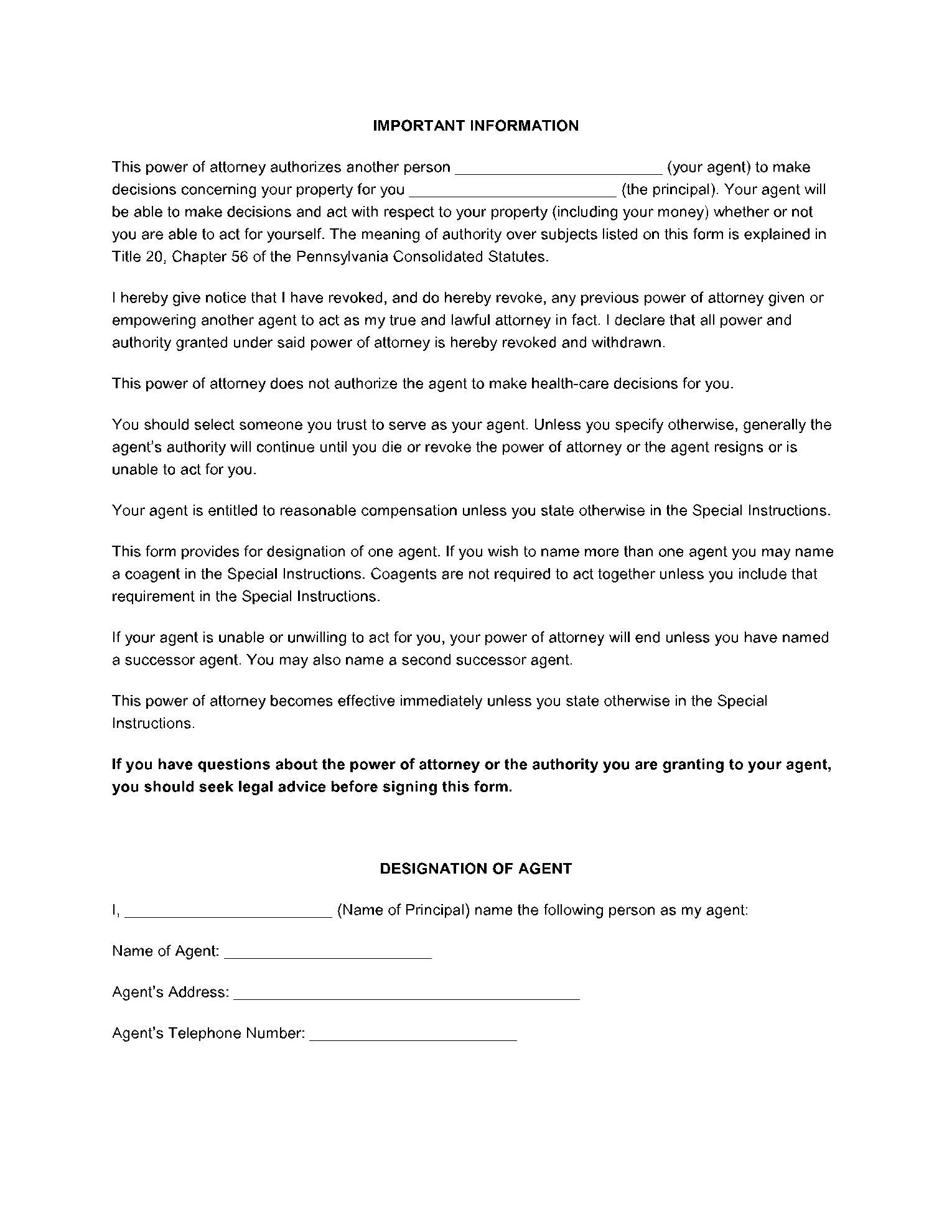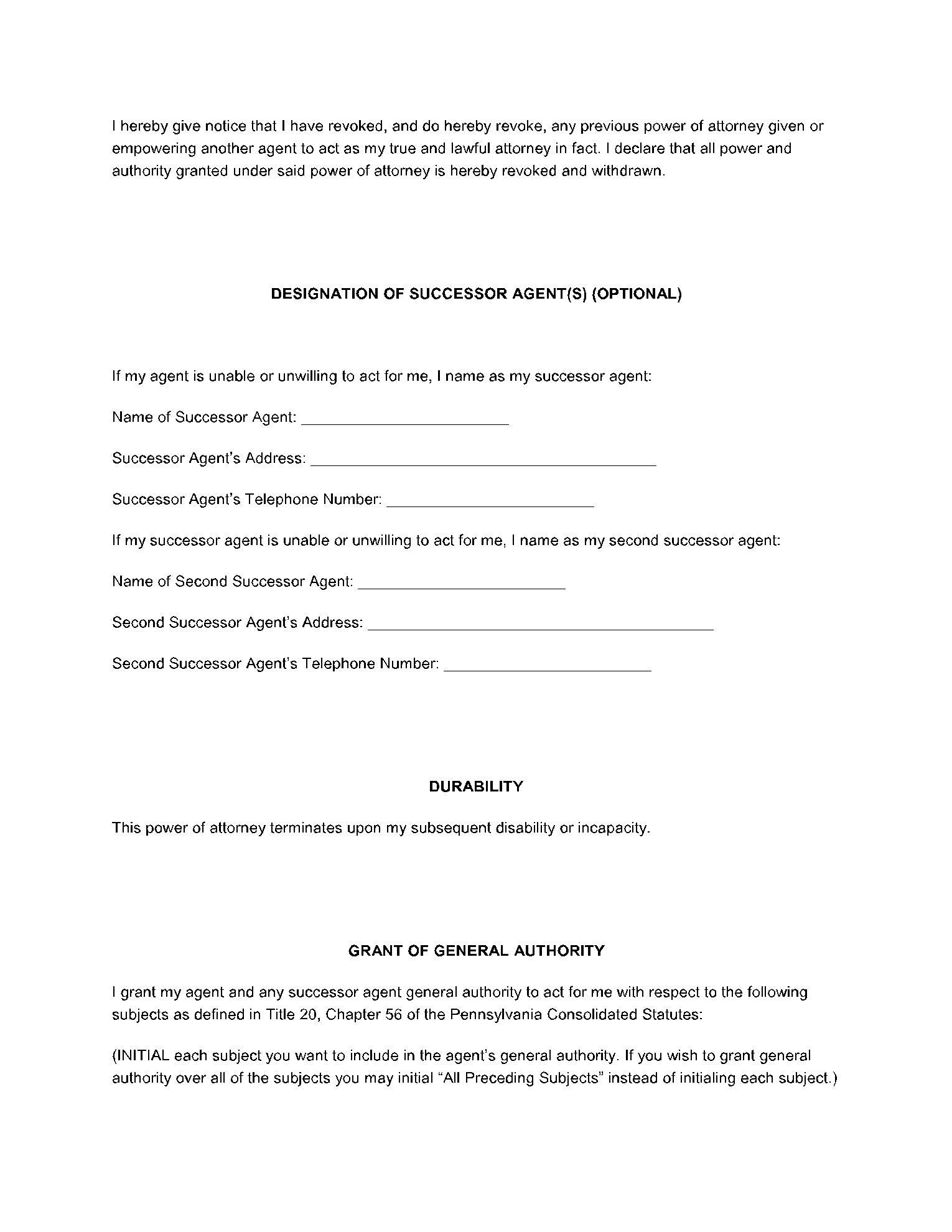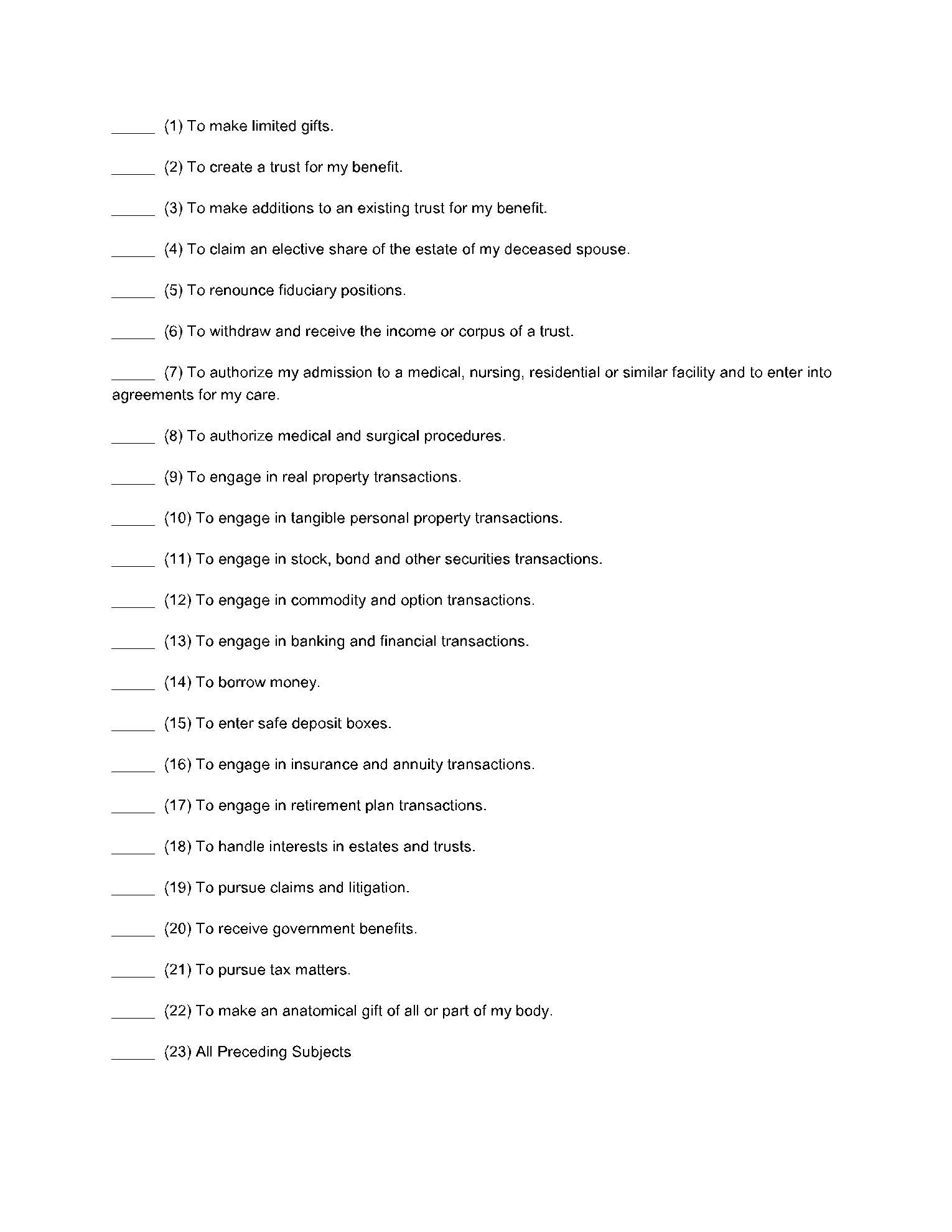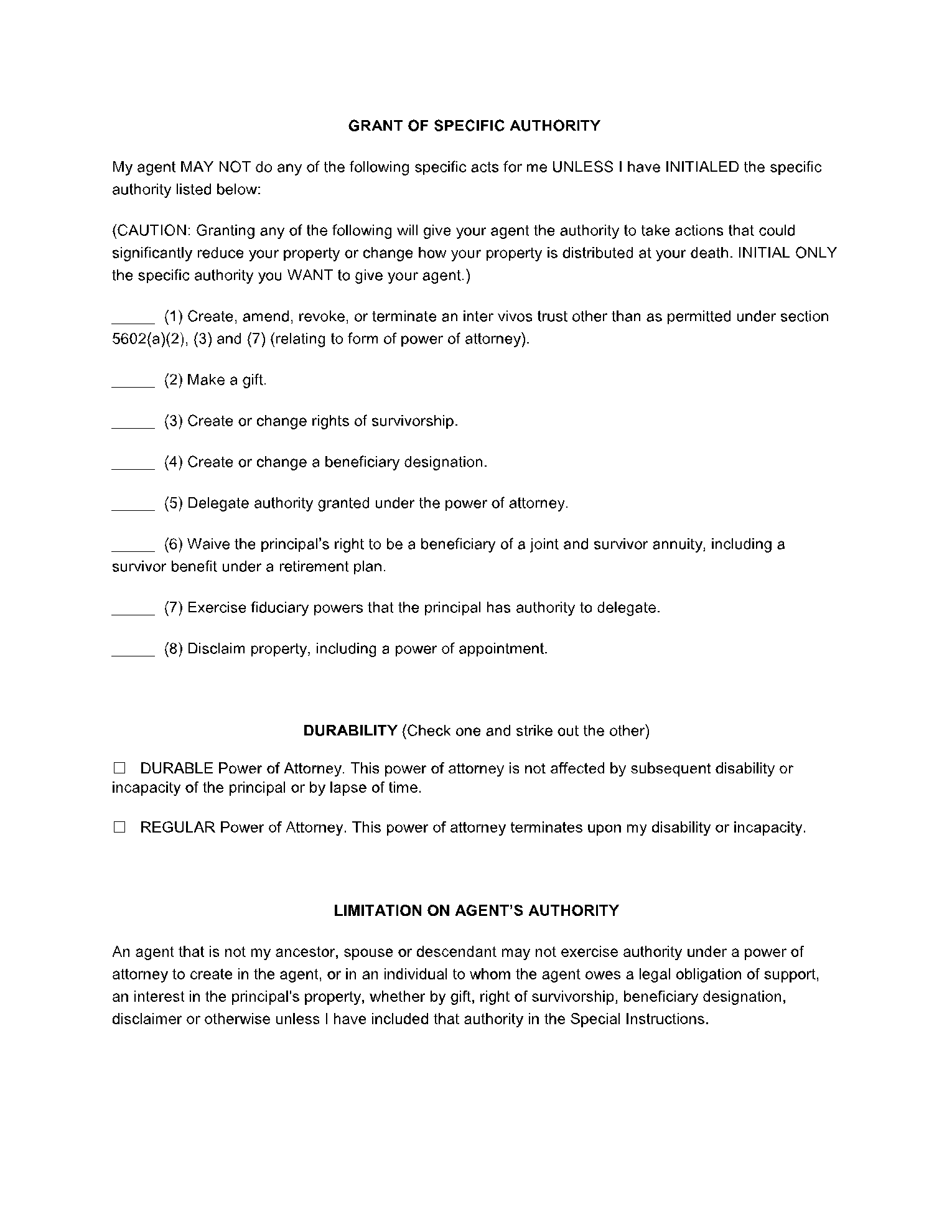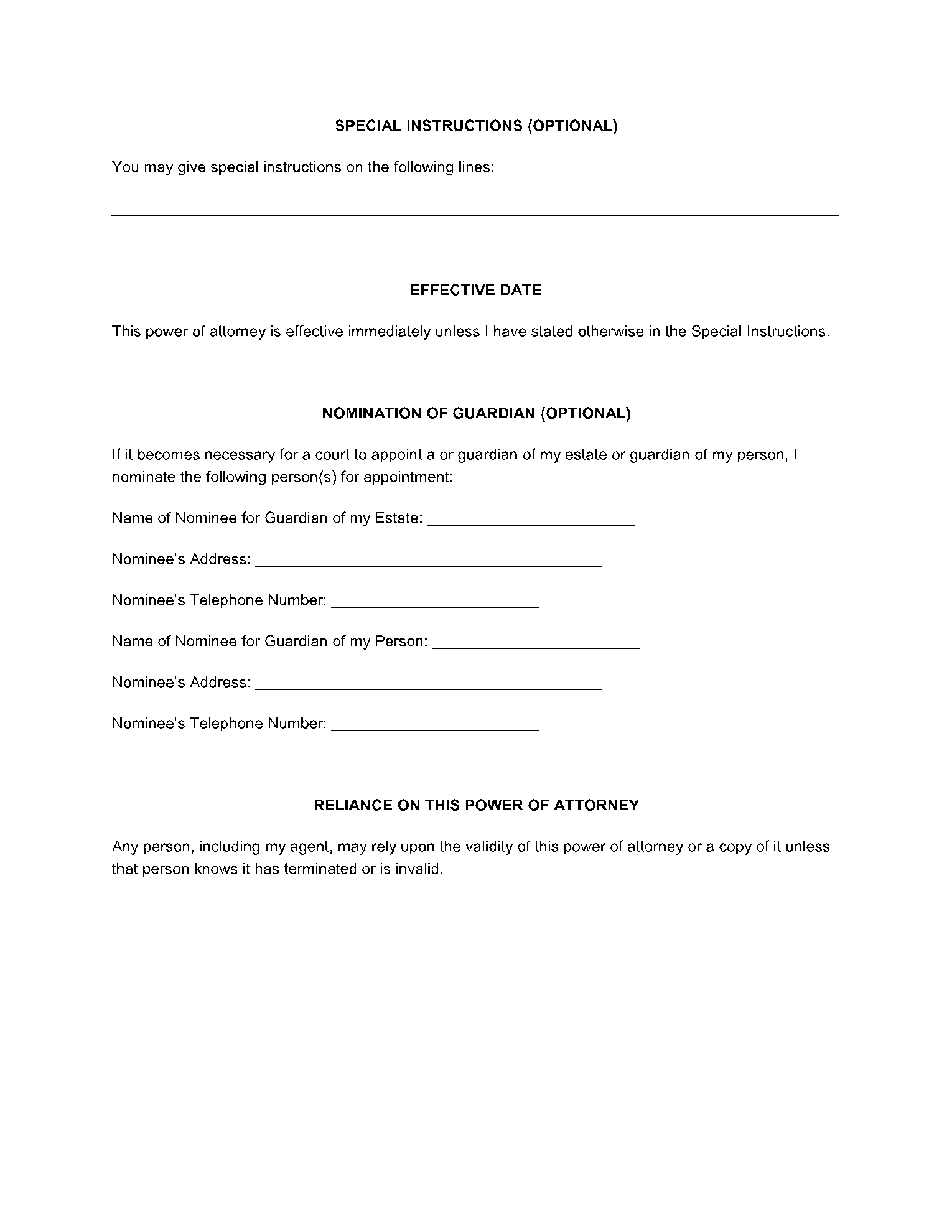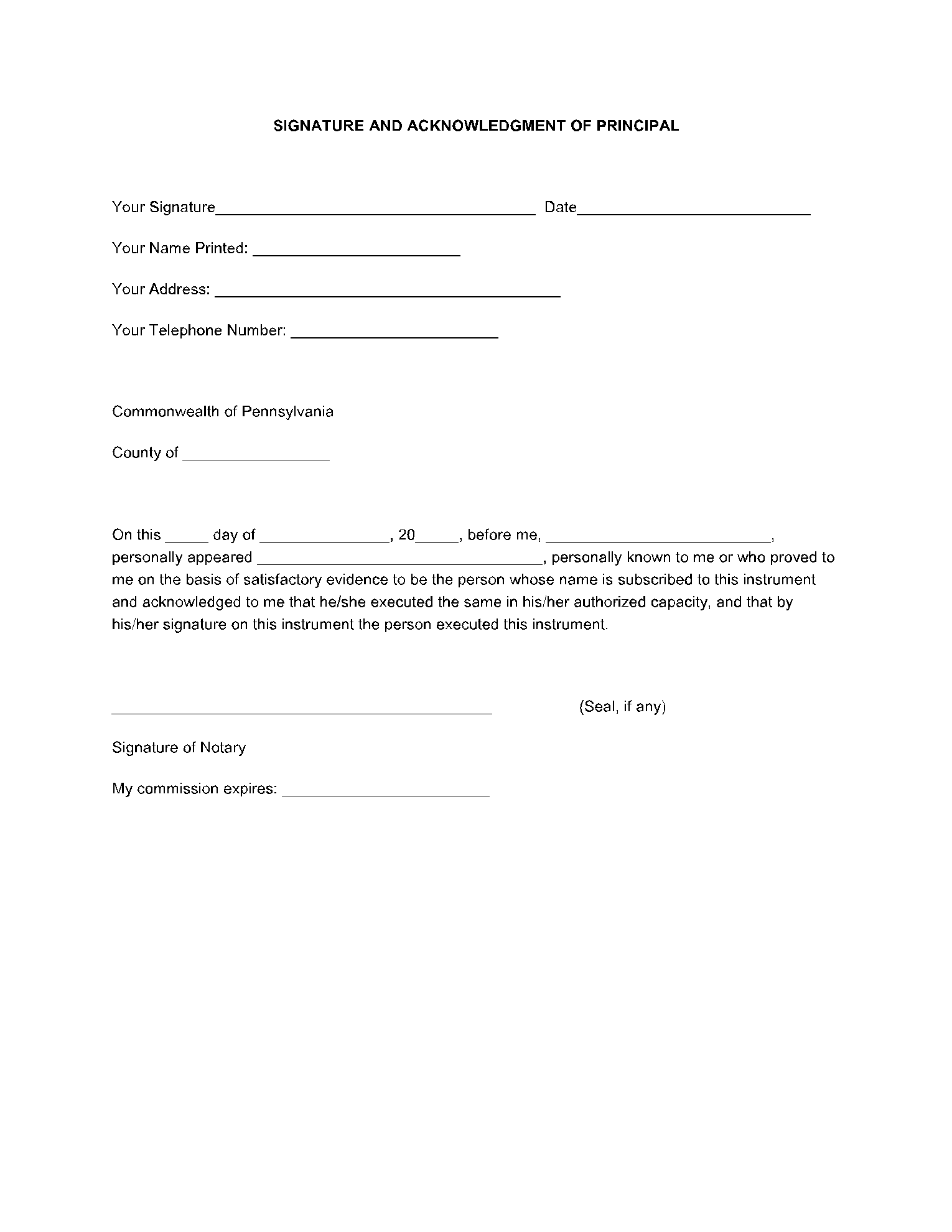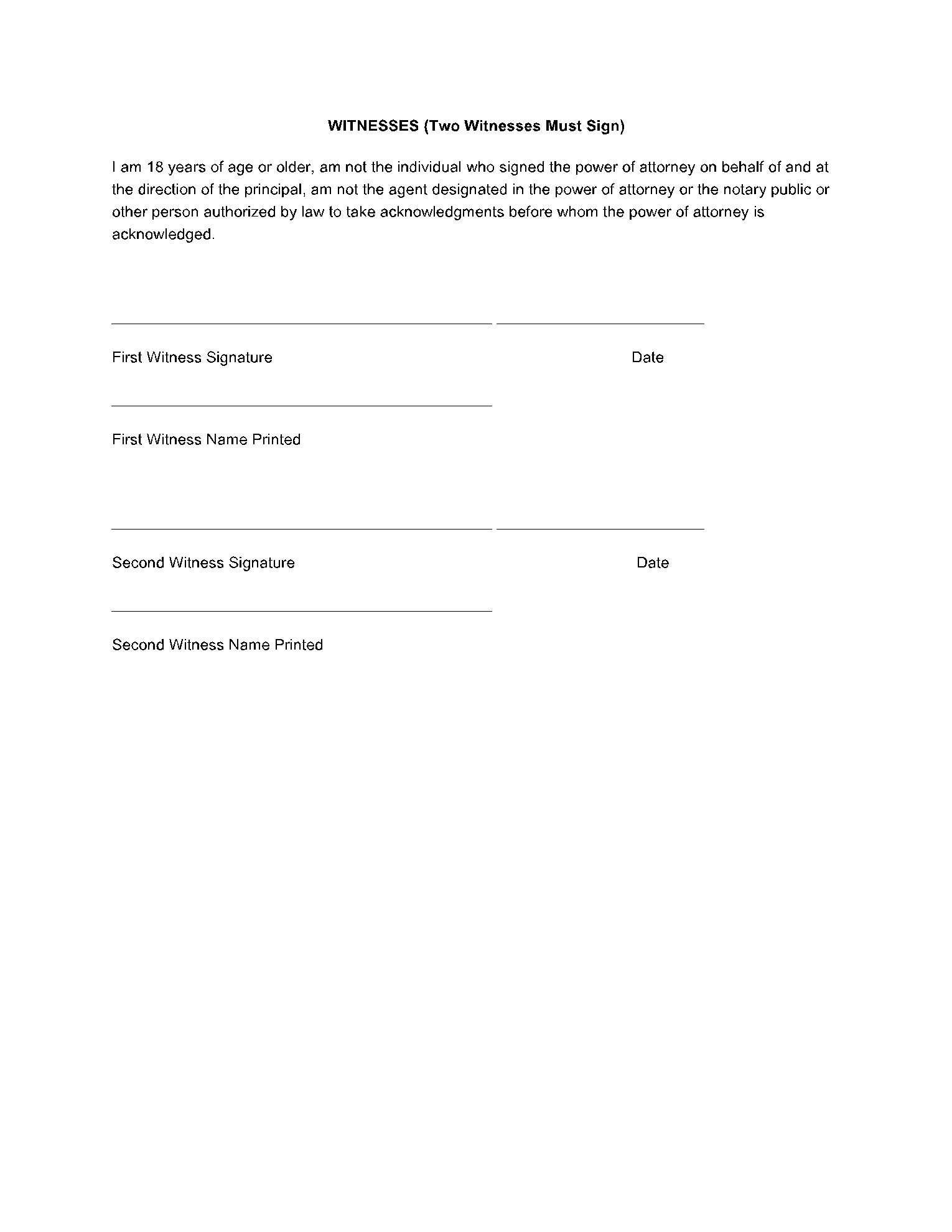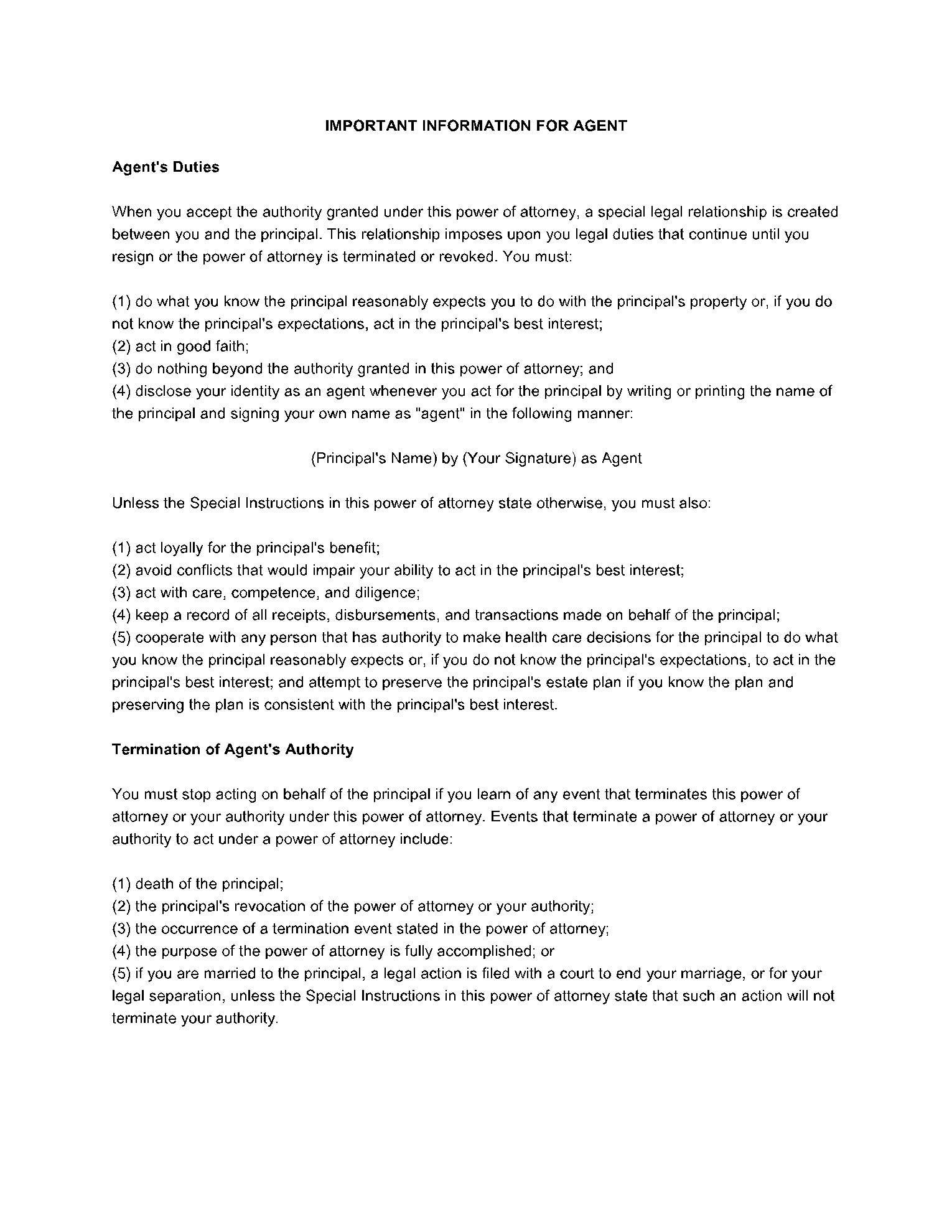A power of attorney (POA) is a legal document drawn to transfer a set of powers from one individual (Principal) to another (Agent). The stipulations for the POA are different in different states. Today we are going to discuss more about the Pennsylvania Power of Attorney.
What is contained in a PA power of attorney:
-
- Type of power of attorney
- Details of principal
- Details of agent
- Purpose
- Property details
- Date of execution Notarized
What is the Pennsylvania Power of Attorney?
Pennsylvania power of attorney form is a legal document drawn to appoint an Agent or attorney-in-fact to act/represent on behalf of the Principal. The Agent can represent the Principal in matters related to finance, health, and estate.
This document can only be drawn if the Principal, on whose behalf the Agent will act, is of a sound mind and can interpret and comprehend the complexities involved. A Principal can draw different kinds of power of attorney based on their requirements.
Try our power of attorney form PA template!
Our power of attorney form PA template has been custom-written by legal experts with your interests in mind. It's clear, concise and customizable -- perfect for anyone!
Click below to download or use this template!
Why Would You Use a Pennsylvania Power of Attorney Form?
If you reside in Pennsylvania, and want to grant someone the right to act on your behalf and make important decisions, Pennsylvania requires you to use a power of attorney form.
A power of attorney form PA outlines the various powers/responsibilities conferred upon the Agent by the Principal clearly and concisely. This legal form documents everything in writing and guides the agent with all the duties and responsibilities they are responsible for.
To avoid any human errors due to an oversight or other situations, several pre-drafted forms are available on CocoSign. In these forms, everything is carefully mentioned, under the Pennsylvania law, as per different types of the POA. Thus, using a pre-drafted form can save a lot of time and effort for all the parties involved.
What are the Power of Attorney Requirements in Pennsylvania?
In the state of Pennsylvania under the current law, the following requirements must be met to draw a POA:
- Both the Principal and the Agent must duly sign the POA.
- Two adult witnesses (over the age of 18) must be present during the signing of the POA.
- The witnesses must not be a party involved in drawing up the POA.
- The Principal can sign the document by using a mark or appointing someone in his place to sign the document.
- A notary public must remain present at the signing to witness, date, and notarize the document.
- Acknowledgment by the Agent that he understands and accepts the responsibilities given to him under the POA.
- The Principal must sign and acknowledge the notice, located in 20 Pa.C.S. Ch. 56., mentioned on top of the form.
Types of Power of Attorney in Pennsylvania
There are eight different types of Pennsylvania Power of Attorney forms:
With the help of this, a person (Principal) can appoint a trustworthy Agent to act on his/her behalf in financial matters even when the Principal is incapacitated. This kind of POA is set for a long term between the two parties.
General Power of Attorney
This type allows the Principal to transfer some of his/her financial powers onto the Agent. However, unlike the Durable POA, General POA is terminated if the Principal becomes incapacitated.
Limited Power of Attorney Form PA
If a Principal wants to pass on certain business-related powers to an Agent for a specific time s/he can do so with the help of limited POA. The document can be terminated once the task is over or the end date can be specified in the document post, which automatically gets revoked.
Medical Power of Attorney Form PA
This allows the Principal to outline instructions concerning his/her end-of-life treatments or medications and appoint an Agent to make those decisions on his/her behalf in case the Principal is not able to do it himself/herself.
Minor Child Power of Attorney
Using this form, a Principal can confer the authority over his/her minor child(ren) to an Agent for a limited time. The Agent is responsible for the child(ren) in such a scenario and can make decisions on child(ren)’s behalf.
Real estate Power of Attorney
To enable an Agent to make real estate related decisions for another individual (Principal) Real Estate Power of Attorney is drawn. This POA is valid for a marked period.
Tax Power of Attorney
With the help of this, a Principal can appoint another individual, preferably a tax professional, to make decisions regarding the tax matters in front of the Pennsylvania Department of Revenue.
Vehicle Power of Attorney
This POA enables an Agent to manage issues or make decisions on behalf of an individual with the Department of Transportation in Pennsylvania.
Try our power of attorney form PA template!
Our power of attorney form PA template has been custom-written by legal experts with your interests in mind. It's clear, concise and customizable -- perfect for anyone!
Click below to download or use this template!
How to Get A Power of Attorney in Pennsylvania?
To get a POA in Pennsylvania, an individual must draw the required document. The document is then to be signed by both the parties (Principal and Agent) in the presence of two witnesses and a notary public. The Agent must confirm that he understands the duties he/she has been called upon to perform. Those duties include:
- Acting under the Principal's reasonable expectations to the extent known by the Agent, and otherwise in the Principal's best interests
- Acting in good faith
- Acting only within the scope of authority granted in the Power of Attorney
Visit CocoSign and download the required PA power of attorney form on the go. CocoSign boasts a range of templates for all the eight types of power of attorney that can be drawn in the state of Pennsylvania.
DOCUMENT PREVIEW
PENNSYLVANIA DURABLE POWER OF ATTORNEY
THE POWERS YOU GRANT BELOW ARE EFFECTIVE
EVEN IF YOU BECOME DISABLED OR INCOMPETENT
NOTICE
THE PURPOSE OF THIS POWER OF ATTORNEY IS TO GIVE THE PERSON YOU DESIGNATE (YOUR "AGENT") BROAD POWERS TO HANDLE YOUR PROPERTY, WHICH MAY INCLUDE POWERS TO SELL OR OTHERWISE DISPOSE OF ANY REAL OR PERSONAL PROPERTY WITHOUT ADVANCE NOTICE TO YOU OR APPROVAL BY YOU.
THIS POWER OF ATTORNEY DOES NOT IMPOSE A DUTY ON YOUR AGENT TO EXERCISE GRANTED POWERS, BUT, WHEN POWERS ARE EXERCISED, YOUR AGENT MUST USE DUE CARE TO ACT FOR YOUR BENEFIT AND IN ACCORDANCE WITH THIS POWER OF ATTORNEY.
YOUR AGENT MAY EXERCISE THE POWERS GIVEN HERE THROUGHOUT YOUR LIFETIME, EVEN AFTER YOU BECOME INCAPACITATED, UNLESS YOU EXPRESSLY LIMIT THE DURATION OF THESE POWERS OR YOU REVOKE THESE POWERS OR A COURT ACTING ON YOUR BEHALF TERMINATES YOUR AGENT'S AUTHORITY.
YOUR AGENT MUST ACT IN ACCORDANCE WITH YOUR REASONABLE EXPECTATIONS TO THE EXTENT ACTUALLY KNOWN BY YOUR AGENT AND, OTHERWISE, IN YOUR BEST INTEREST, ACT IN GOOD FAITH AND ACT ONLY WITHIN THE SCOPE OF AUTHORITY GRANTED BY YOU IN THE POWER OF ATTORNEY.
THE LAW PERMITS YOU, IF YOU CHOOSE, TO GRANT BROAD AUTHORITY TO AN AGENT UNDER POWER OF ATTORNEY, INCLUDING THE ABILITY TO GIVE AWAY ALL OF YOUR PROPERTY WHILE YOU ARE ALIVE OR TO SUBSTANTIALLY CHANGE HOW YOUR PROPERTY IS DISTRIBUTED AT YOUR DEATH. BEFORE SIGNING THIS DOCUMENT, YOU SHOULD SEEK THE ADVICE OF AN ATTORNEY AT LAW TO MAKE SURE YOU UNDERSTAND IT.
A COURT CAN TAKE AWAY THE POWERS OF YOUR AGENT IF IT FINDS YOUR AGENT IS NOT ACTING PROPERLY.
THE POWERS AND DUTIES OF AN AGENT UNDER A POWER OF ATTORNEY ARE EXPLAINED MORE FULLY IN 20 PA.C.S. CH. 56.
IF THERE IS ANYTHING ABOUT THIS FORM THAT YOU DO NOT UNDERSTAND, YOU SHOULD ASK A LAWYER OF YOUR OWN CHOOSING TO EXPLAIN IT TO YOU.
I HAVE READ OR HAD EXPLAINED TO ME THIS NOTICE AND I UNDERSTAND ITS CONTENTS.
__________________________________
Principal’s Signature
__________________________________
Printed Name
__________________________________
Date
I, __________________________________ [PRINCIPAL’S NAME] with a mailing address of
________________________________________________________________ [PRINCIPAL’S ADDRESS]
HEREBY APPOINT
__________________________________ [AGENT’S NAME] with a mailing address of
_________________________________________________________ [AGENT’S NAME AND ADDRESS]
as my Agent (attorney-in-fact) to act for me in any lawful way with respect to the following initialed subjects:
TO GRANT ALL OF THE FOLLOWING POWERS, INITIAL THE LINE IN FRONT OF (N) AND IGNORE THE LINES IN FRONT OF THE OTHER POWERS.
TO GRANT ONE OR MORE, BUT FEWER THAN ALL, OF THE FOLLOWING POWERS, INITIAL THE LINE IN FRONT OF EACH POWER YOU ARE GRANTING.
TO WITHHOLD A POWER, DO NOT INITIAL THE LINE IN FRONT OF IT. YOU MAY, BUT NEED NOT, CROSS OUT EACH POWER WITHHELD.
Note: If you initial Item A or Item B, which follow, a notarized signature will be required on behalf of the Principal.
INITIAL
_______ (A) Real property transactions. To lease, sell, mortgage, purchase, exchange, and acquire, and to agree, bargain, and contract for the lease, sale, purchase, exchange, and acquisition of, and to accept, take, receive, and possess any interest in real property whatsoever, on such terms and conditions, and under such covenants, as my Agent shall deem proper; and to maintain, repair, tear down, alter, rebuild, improve manage, insure, move, rent, lease, sell, convey, subject to liens, mortgages, and security deeds, and in any way or manner deal with all or any part of any interest in real property whatsoever, including specifically, but without limitation, real property lying and being situated in the Commonwealth of Pennsylvania, under such terms and conditions, and under such covenants, as my Agent shall deem proper and may for all deferred payments accept purchase money notes payable to me and secured by mortgages or deeds to secure debt, and may from time to time collect and cancel any of said notes, mortgages, security interests, or deeds to secure debt.
_______ (B) Tangible personal property transactions. To lease, sell, mortgage, purchase, exchange, and acquire, and to agree, bargain, and contract for the lease, sale, purchase, exchange, and acquisition of, and to accept, take, receive, and possess any personal property whatsoever, tangible or intangible, or interest thereto, on such terms and conditions, and under such covenants, as my Agent shall deem proper; and to maintain, repair, improve, manage, insure, rent, lease, sell, convey, subject to liens or mortgages, or to take any other security interests in said property which are recognized under the Uniform Commercial Code as adopted at that time under the laws of the Commonwealth of Pennsylvania or any applicable state, or otherwise hypothecate (pledge), and in any way or manner deal with all or any part of any real or personal property whatsoever, tangible or intangible, or any interest therein, that I own at the time of execution or may thereafter acquire, under such terms and conditions, and under such covenants, as my Agent shall deem proper.
_______ (C) Stock and bond transactions.
To purchase, sell, exchange, surrender, assign, redeem, vote at any meeting, or otherwise transfer any and all shares of stock, bonds, or other securities in any business, association, corporation, partnership, or other legal entity, whether private or public, now or hereafter belonging to me.
_______ (D) Commodity and option transactions. To buy, sell, exchange, assign, convey, settle and exercise commodities futures contracts and call and put options on stocks and stock indices traded on a regulated options exchange and collect and receipt for all proceeds of any such transactions; establish or continue option accounts for the principal with any securities or futures broker; and, in general, exercise all powers with respect to commodities and options which the principal could if present and under no disability.
_______ (E) Banking and other financial institution transactions. To make, receive, sign, endorse, execute, acknowledge, deliver and possess checks, drafts, bills of exchange, letters of credit, notes, stock certificates, withdrawal receipts and deposit instruments relating to accounts or deposits in, or certificates of deposit of banks, savings and loans, credit unions, or other institutions or associations. To pay all sums of money, at any time or times, that may hereafter be owing by me upon any account, bill of exchange, check, draft, purchase, contract, note, or trade acceptance made, executed, endorsed, accepted, and delivered by me or for me in my name, by my Agent. To borrow from time to time such sums of money as my Agent may deem proper and execute promissory notes, security deeds or agreements, financing statements, or other security instruments in such form as the lender may request and renew said notes and security instruments from time to time in whole or in part. To have free access at any time or times to any safe deposit box or vault to which I might have access.
_______ (F) Business operating transactions. To conduct, engage in, and otherwise transact the affairs of any and all lawful business ventures of whatever nature or kind that I may now or hereafter be involved in. To organize or continue and conduct any business which term includes, without limitation, any farming, manufacturing, service, mining, retailing or other type of business operation in any form, whether as a proprietorship, joint venture, partnership, corporation, trust or other legal entity; operate, buy, sell, expand, contract, terminate or liquidate any business; direct, control, supervise, manage or participate in the operation of any business and engage, compensate and discharge business managers, employees, agents, attorneys, accountants and consultants; and, in general, exercise all powers with respect to business interests and operations which the principal could if present and under no disability.
_______ (G) Insurance and annuity transactions. To exercise or perform any act, power, duty, right, or obligation, in regard to any contract of life, accident, health, disability, liability, or other type of insurance or any combination of insurance; and to procure new or additional contracts of insurance for me and to designate the beneficiary of same; provided, however, that my Agent cannot designate himself or herself as beneficiary of any such insurance contracts.
_______ (H) Estate, trust, and other beneficiary transactions. To accept, receipt for, exercise, release, reject, renounce, assign, disclaim, demand, sue for, claim and recover any legacy, bequest, devise, gift or other property interest or payment due or payable to or for the principal; assert any interest in and exercise any power over any trust, estate or property subject to fiduciary control; establish a revocable trust solely for the benefit of the principal that terminates at the death of the principal and is then distributable to the legal representative of the estate of the principal; and, in general, exercise all powers with respect to estates and trusts which the principal could exercise if present and under no disability; provided, however, that the Agent may not make or change a will and may not revoke or amend a trust revocable or amendable by the principal or require the trustee of any trust for the benefit of the principal to pay income or principal to the Agent unless specific authority to that end is given.
_______ (I) Claims and litigation. To commence, prosecute, discontinue, or defend all actions or other legal proceedings touching my property, real or personal, or any part thereof, or touching any matter in which I or my property, real or personal, may be in any way concerned. To defend, settle, adjust, make allowances, compound, submit to arbitration, and compromise all accounts, reckonings, claims, and demands whatsoever that now are, or hereafter shall be, pending between me and any person, firm, corporation, or other legal entity, in such manner and in all respects as my Agent shall deem proper.
_______ (J) Personal and family maintenance. To hire accountants, attorneys at law, consultants, clerks, physicians, nurses, agents, servants, workmen, and others and to remove them, and to appoint others in their place, and to pay and allow the persons so employed such salaries, wages, or other remunerations, as my Agent shall deem proper.
_______ (K) Benefits from Social Security, Medicare, Medicaid, or other governmental programs, or military service. To prepare, sign and file any claim or application for Social Security, unemployment or military service benefits; sue for, settle or abandon any claims to any benefit or assistance under any federal, state, local or foreign statute or regulation; control, deposit to any account, collect, receipt for, and take title to and hold all benefits under any Social Security, unemployment, military service or other state, federal, local or foreign statute or regulation; and, in general, exercise all powers with respect to Social Security, unemployment, military service, and governmental benefits, including but not limited to Medicare and Medicaid, which the principal could exercise if present and under no disability.
_______ (L) Retirement plan transactions. To contribute to, withdraw from and deposit funds in any type of retirement plan (which term includes, without limitation, any tax qualified or nonqualified pension, profit sharing, stock bonus, employee savings and other retirement plan, individual retirement account, deferred compensation plan and any other type of employee benefit plan); select and change payment options for the principal under any retirement plan; make rollover contributions from any retirement plan to other retirement plans or individual retirement accounts; exercise all investment powers available under any type of self-directed retirement plan; and, in general, exercise all powers with respect to retirement plans and retirement plan account balances which the principal could if present and under no disability.
_______ (M) Tax matters. To prepare, to make elections, to execute and to file all tax, social security, unemployment insurance, and informational returns required by the laws of the United States, or of any state or subdivision thereof, or of any foreign government; to prepare, to execute, and to file all other papers and instruments which the Agent shall think to be desirable or necessary for safeguarding of me against excess or illegal taxation or against penalties imposed for claimed violation of any law or other governmental regulation; and to pay, to compromise, or to contest or to apply for refunds in connection with any taxes or assessments for which I am or may be liable.
_______ (N) ALL OF THE POWERS LISTED ABOVE. YOU NEED NOT INITIAL ANY OTHER LINES IF YOU INITIAL LINE (N).
SPECIAL INSTRUCTIONS:
ON THE FOLLOWING LINES YOU MAY GIVE SPECIAL INSTRUCTIONS LIMITING OR EXTENDING THE POWERS GRANTED TO YOUR AGENT.
______________________________________________________________________________________
______________________________________________________________________________________
THIS POWER OF ATTORNEY IS EFFECTIVE IMMEDIATELY AND WILL CONTINUE UNTIL IT IS REVOKED.
THIS POWER OF ATTORNEY SHALL BE CONSTRUED AS A GENERAL DURABLE POWER OF ATTORNEY AND SHALL CONTINUE TO BE EFFECTIVE EVEN IF I BECOME DISABLED, INCAPACITATED, OR INCOMPETENT.
(YOUR AGENT WILL HAVE AUTHORITY TO EMPLOY OTHER PERSONS AS NECESSARY TO ENABLE THE AGENT TO PROPERLY EXERCISE THE POWERS GRANTED IN THIS FORM, BUT YOUR AGENT WILL HAVE TO MAKE ALL DISCRETIONARY DECISIONS. IF YOU WANT TO GIVE YOUR AGENT THE RIGHT TO DELEGATE DISCRETIONARY DECISION-MAKING POWERS TO OTHERS, YOU SHOULD KEEP THE NEXT SENTENCE, OTHERWISE IT SHOULD BE STRICKEN.)
Authority to Delegate. My Agent shall have the right by written instrument to delegate any or all of the foregoing powers involving discretionary decision-making to any person or persons whom my Agent may select, but such delegation may be amended or revoked by any agent (including any successor) named by me who is acting under this power of attorney at the time of reference.
